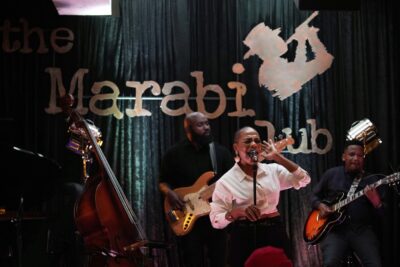A jazz club in Johannesburg plays its last songs and laments downtown’s decline
By Canadian Press on May 11, 2025.

JOHANNESBURG (AP) — On a Friday evening in downtown Johannesburg, a world away from the genteel suburbs that include some of Africa’s wealthiest neighborhoods, groups of men huddle on a dark street as a security patrol whizzes past.
Around the corner, popular jazz venue the Marabi Club is hosting its last Friday night show before closing down – another victim of the city center’s decay and the jarring inequality in post-apartheid South Africa.
“It’s devastating. This is such an iconic space in the inner city and now we have one more reason not to come downtown. It’s a true sign of the city’s decline,” said Renata Lawton-Misra, 34, a climate change consultant, attending the concert with her husband, Kyle Schutte.
For Schutte, the reasons behind the closure are clear. “Safety concerns,” said the 38-year-old financial consultant who said he wouldn’t normally set foot in the area. Downtown is now known for rampant crime and dilapidated infrastructure after an exodus of white people to the suburbs after the apartheid system of racial segregation ended in 1994. “True or not, perception is the issue.”
The Marabi Club had been part of a wave of investments designed to reinvigorate downtown, in particular the Maboneng district, about a decade ago. It was founded in 2017 by TJ Steyn, son of the late South African insurance magnate Douw Steyn, and Dale De Ruig.
The club attracted visitors including Jay Z and Beyonce.
“Look at what we created here with amazing food and music,” said waiter Emanuel Mcotheli, pointing to the packed room of mainly Black urban professionals.
The club was named after marabi, a jazz movement that emerged in the 1920s, to honor South Africa’s rich musical heritage. Back then, miners and day laborers would congregate downtown and were drawn into illegal shebeens (taverns) by the sound of marabi, repetitive and improvisational keyboard tunes.
The genre gained popularity through bands like the Jazz Maniacs and influential artists such as Hugh Masekela and Miriam Makeba.
“I grew up singing marabi,” said the club’s resident vocalist Mbalizethu Siluma, 40, who sings soul and R&B, inviting the snappily dressed guests to dance after dinner.
Despite the attention the club has received, South Africa’s strict COVID-19 lockdown severely hit it and other businesses that hoped to reshape parts of downtown Johannesburg. A succession of short-lived mayors, eight in five years, made things worse as essential public works went undone.
The neglect of downtown Johannesburg was exposed to international attention in 2023 when a fire in an overcrowded apartment building left unregulated by authorities killed 76 people.
“We knew it wasn’t the perfect place to open a jazz club but we were hopeful that it was on an upward move,” De Ruig told The Associated Press. “Ultimately, it was a bit of a false start.”
He said the city has provided almost “almost no support” and basic requests for better lighting, security and cleaning in the area were ignored.
The city’s government said it could not comment on the reasons behind a private venue shutting its doors, but spokesperson Nthatisi Modingoane said it was “unfortunate for the creative economy.”
For Lusanda Netshitenzhe, a member of the steering committee for the Joburg Crisis Alliance, a coalition working to end corruption and improve city government services, the Marabi Club’s closing represents a broader issue.
“People unfortunately don’t feel safe getting to Maboneng,” Netshitenzhe said. The area “once celebrated … is unfortunately no longer doing well due to continued deep systemic issues, poor urban governance and lack of leadership in the city of Johannesburg.”
Mayor Dada Morero said in his State of the City address this month that “drastic times call for drastic measures” and vowed to intensify efforts to revitalize the inner city, including rehabilitating abandoned buildings and installing public lighting.
Any plans for reviving the area come too late for the club and its musicians.
“Maybe there’s something better coming … look at how this place is, Marabi isn’t dying,” Siluma said before hitting the stage.
De Ruig and his partner are considering moving the club to Steyn City, a gated commercial and residential estate owned by the Steyn family, 32 kilometers (20 miles) north of Johannesburg’s city center.
Downtown is left to those who can’t afford to leave.
___
More AP Africa news: https://apnews.com/hub/africa
Louise Dewast, The Associated Press
-27


